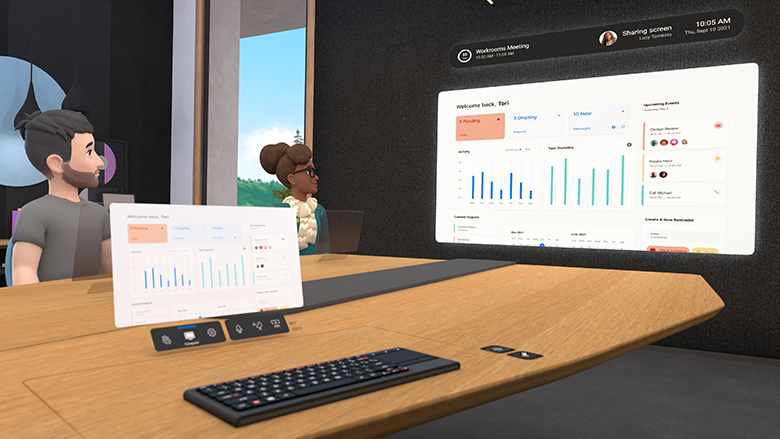Facebook reveals its future of meetings: cartoon colleagues talking to each other in virtual reality
‘Workrooms’ is a new feature for Oculus Quest devices that uses hand tracking and spatial audio to recreate meeting rooms
Your support helps us to tell the story
From reproductive rights to climate change to Big Tech, The Independent is on the ground when the story is developing. Whether it's investigating the financials of Elon Musk's pro-Trump PAC or producing our latest documentary, 'The A Word', which shines a light on the American women fighting for reproductive rights, we know how important it is to parse out the facts from the messaging.
At such a critical moment in US history, we need reporters on the ground. Your donation allows us to keep sending journalists to speak to both sides of the story.
The Independent is trusted by Americans across the entire political spectrum. And unlike many other quality news outlets, we choose not to lock Americans out of our reporting and analysis with paywalls. We believe quality journalism should be available to everyone, paid for by those who can afford it.
Your support makes all the difference.Mark Zuckerberg – or a cartoon version of the Facebook chief executive – has revealed what he hopes is the future of meetings, in the form of virtual reality rooms.
The company has revealed “Horizon Workrooms”, which shows avatars of everyone in a meeting talking with each other, as if they were really together.
It is the company’s most ambitious effort yet to take its social network into virtual reality, allowing people to chat together while working from home or different countries.
Horizon Workrooms is available as an app for Facebook’s VR headset, the Oculus Quest 2. It includes mixed-reality desk and keyboard tracking, hand tracking, remote desktop streaming, video conferencing integration, spatial audio, and the new Oculus Avatars - animated figures that can be customised to look like the user.
Users are able to join the meeting in virtual reality or dial into a virtual room through a video call.
“Workrooms is a mixed reality experience, letting you bring your physical desk and compatible tracked keyboard into the virtual room with you, where you can see them sitting on the virtual meeting table in front of you”, Facebook says. The system uses the Oculus Remote Desktop companion app for Mac and Windows computers to access users “entire computer” in virtual reality, taking notes and sharing screens with colleagues.
Facebook is using spatial audio to make the virtual room feel more realistic, which should give the same sense of distance and space as if the meeting was taking place in a real room.
This appears to work adequately. “When someone talked in one corner of the room, it sounded like their voice was coming from that direction. At one point the seating chart was changed and I felt as if someone sitting behind me in VR was actually speaking from behind my head”, The Verge’s Alex Heath, who has used the virtual reality product, wrote.

That room is also customisable with a “seating layout for every occasion” such as conversations or presentations, with the virtual space scaling up and down to fit the size of the group.
Up to 16 people can be in the same virtual room together with up to 50 people being able to coin a single call, which can be managed via Outlook and Google Calendar. Video participants will show up on a video screen in the virtual room, “just like a real conference room”.
Facebook says that it has designed Workrooms to prioritise hand tracking and user interface, rather than controllers, which it says creates “a more natural and expressive social experience and lets you switch more easily between physical tools like your keyboard and controllers when needed.”
Workrooms is only for users over the age of 18, and Facebook says that it will not use work conversations and materials to inform ads on Facebook.
“The audio contents of your meeting are processed on Facebook servers but not stored, unless someone records and sends us a clip as part of a report”, it adds, with the images and videos taken of users’ physical environments processed locally and inaccessible to Facebook or other third-party apps.
Andrew Bosworth, VP of Facebook Reality Labs, told CNN he had been using the feature internally for a year and that he expects people will use the app for about 30 minutes at a time.
A team at Facebook is apparently working on improving the ergonomics of virtual reality and, as well as reducing its weight of the headset.
The new product is part of the company’s aim to pivot towards being a ‘metaverse’ company, according to CEO Mark Zuckerberg.
The metaverse, in Mr Zuckerberg’s vision, will be about “engag[ing] more naturally” with the behaviours we already exhibit – such as reaching for our smartphones immediately upon waking up.
“We have these phones. They’re relatively small. A lot of the time that we’re spending, we’re basically mediating our lives and our communication through these small, glowing rectangles. I think that that’s not really how people are made to interact”, Mr Zuckerberg said
Mr Zuckerberg has made such comments before, hypothesizing that humans should “be teleporting, not transporting ourselves” into various environments through virtual and mixed reality environments.

Join our commenting forum
Join thought-provoking conversations, follow other Independent readers and see their replies
Comments